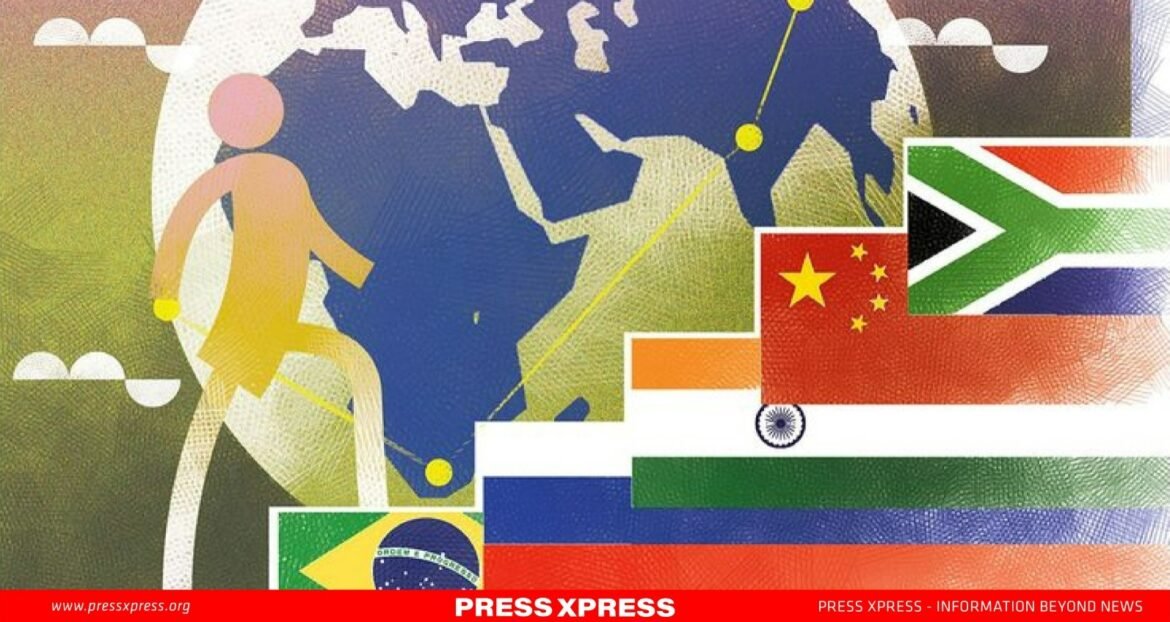The wave of change initiated by BRICS may well be the catalyst for a more equitable and balanced global economic future
The BRICS group is comprised of Brazil, Russia, India, China, and South Africa. In recent years, it has emerged as a formidable force in the global economic landscape to reshape global dynamics. The economic clout of Brazil, Russia, India, China, and South Africa has not only strengthened but has also paved the way for changing political dynamics on a global scale.
The BRICS influence extends further as new members, including Argentina, Egypt, Ethiopia, Iran, Saudi Arabia, and the UAE, are set to join this formidable Global South economic alliance in January. This expansion marks a significant step towards a more inclusive and powerful economic consortium.
You can also read: Xi Jinping’s Challenges: BRICS Expansion and Global South Appeal
A Bloomberg report on November 3, 2023, underscores the undeniable growth, revealing a staggering 56% increase in trade among the founding members from 2017 to 2022, reaching a remarkable “$422 billion worth of turnover” last year alone.
BRICS Shifts Global Dynamic
In 2023, BRICS experienced a positive year, primarily attributed to US sanctions on Russia. This compelled Moscow to look southward for new markets, particularly for its natural gas and petroleum products. If the current growth trajectory persists, the expanded BRICS is poised to independently contribute to almost half of the global economic output by 2040.

To make this more understandable, upcoming data indicates that in the coming years, BRICS will effectively double the economic share of the G7 group. Until recently, the G7’s economic influence defined global trends in both growth and decline.
This unequivocally signifies a fundamental shift in the center of global economic fortunes, inevitably leading to a change in global political dynamics. As smaller economies prepare to join the BRICS, their aspiration is to be part of a robust economic engine.
Traditionally, the world was governed by Western economic institutions operating on two sets of rules: one for Western states, based on mutual benefits and cooperation, and another for the Global South, centered on control, hegemony, and occasionally coercion. BRICS has recognized this disparity. The group acknowledges that Western institutions are not prepared to engage with Global South countries based on economic balance and equality. Rather than pleading, they have chosen to construct their alternative economic structure, thereby fully liberating their nations from the conditions imposed by the International Monetary Fund, the World Bank, and similar entities.
World Bank and IMF vs BRICS
Since 2009, BRICS nations have initiated efforts that contest the prevailing US-led financial system and global order. These efforts encompass establishing the New Development Bank (NDB) as an alternative to the World Bank and the IMF, and introducing the BRICS Payment System (BPS) to lessen reliance on the US-dominated SWIFT.
Recent financial reports indicate that BRICS has become the world’s largest bloc in terms of gross domestic product (GDP), contributing 31.5% to the global GDP. This surpasses the G7, which contributes 30.7%. The International Monetary Fund (IMF) and World Bank are known for tying their monetary support, especially to countries in the Global South, to political conditions. While they often justify these conditions in the name of human rights and democracy, the underlying motivation is often linked to privatization and opening markets for foreign investors, primarily Western corporations.
As BRICS continues to strengthen, it possesses the potential to assist less affluent countries without imposing a self-serving political agenda. This stands in contrast to the indirect manipulation and control of local economies that often accompany the support from the IMF and World Bank.
In the face of inflation affecting many Western nations, leading to slower economic growth and social unrest, countries in the Global South view this as an opportunity to forge their own economic alternatives. Consequently, entities like BRICS are evolving beyond being solely economic institutions, signaling a shift towards broader socio-economic considerations.
BRICS vs Predatory Capitalism
For a shift in this relationship to occur, BRICS would need to function as the primary defense against the West’s superior approach to the Global South.
While European Union Foreign Policy chief Josep Borrell’s statement that “Europe is a garden” and “the rest of the world is a jungle” wasn’t specifically made in an economic context in October 2022, the sentiment holds true irrespective of the context.
Although the potential of the Global South extends beyond BRICS, this influential new platform instills much hope for a fundamental shift in the relationship between the West and the rest of the world.
Conclusion
BRICS is not merely wishful thinking or hype; it is a tangible force reshaping the world order. As the alliance expands and experiments with alternative economic structures, there is a palpable sense of hope that a fundamental change in the relationship between the Global South and the West is not only possible but inevitable. The wave of change initiated by BRICS may well be the catalyst for a more equitable and balanced global economic future.


